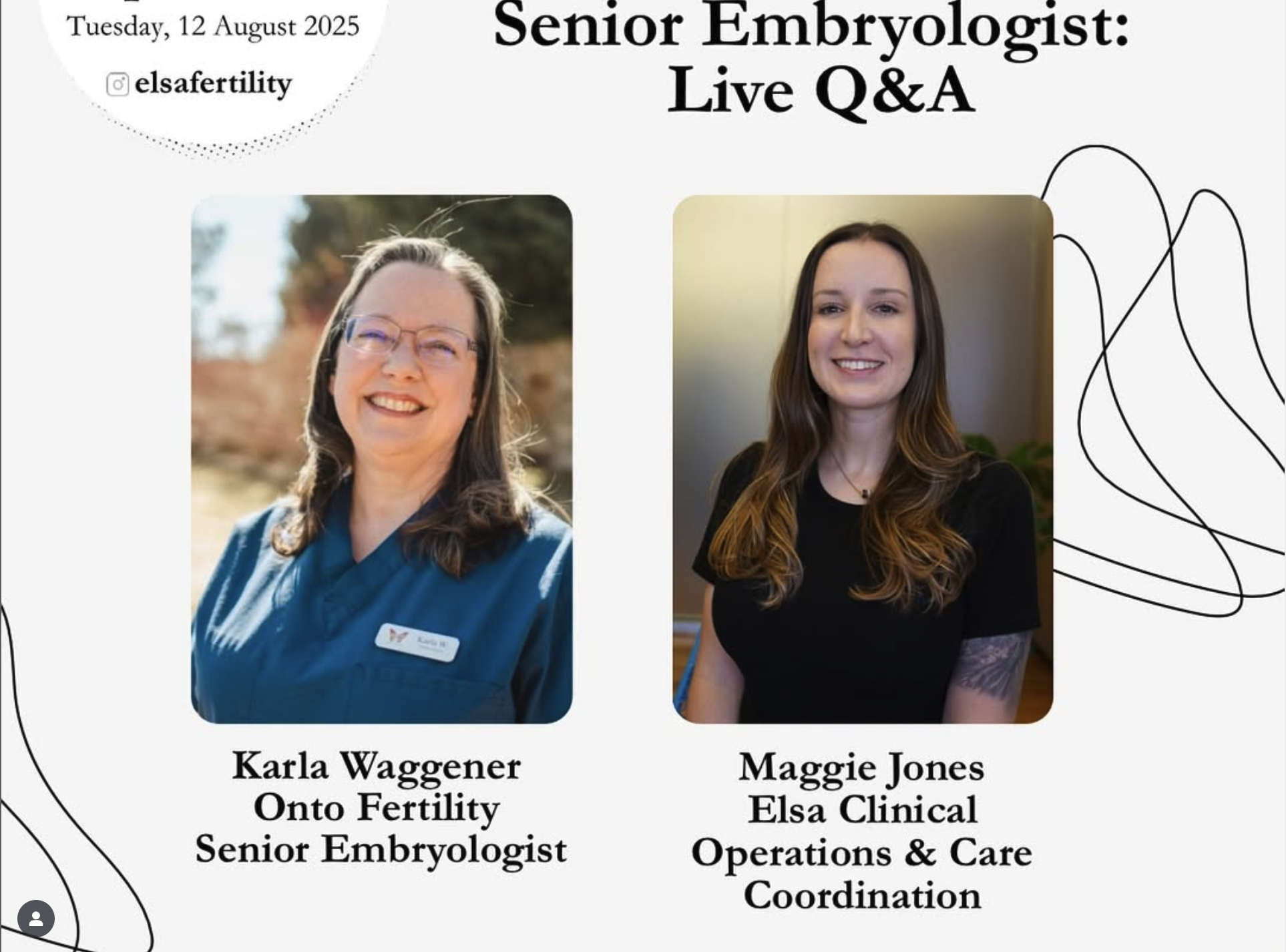Egg Freezing vs. Embryo Freezing: Which Is Right for You?

Fertility preservation has come to be an invaluable choice for many individuals looking to take control of their reproductive future. Whatever your reason may be for preserving your fertility, options like egg freezing and embryo freezing can serve as empowering ways to plan ahead.
However, deciding which option between freezing eggs vs. embryos best suits your unique circumstances isn't always a straightforward process. Should you freeze your eggs to keep your options open? Or would freezing embryos provide you more certainty for the future?
In this article, we break down the key differences between frozen eggs vs. frozen embryos, and help you decide which might be the right choice for you.
What Is Egg Freezing?
Egg freezing (or oocyte cryopreservation) is a process in which a woman's eggs are grown, retrieved, frozen, and stored for future use. This method involves the following key steps:
- Ovarian Stimulation: Hormonal medications are used to stimulate the ovaries to produce multiple eggs in one cycle.
- Egg Retrieval: Once the eggs indicate adequate maturity, they are retrieved through a minor outpatient procedure.
- Freezing: The eggs are flash-frozen using a method called vitrification to preserve their quality for future use.
What Is Embryo Banking or Freezing?
The process of embryo freezing (or embryo cryopreservation) is comparable to that of egg freezing — save for one crucial difference: the eggs are fertilized with sperm and grown to an embryo called a blastocyst before freezing for future use.
Here's how the process works:
- Ovarian Stimulation: Just like in egg freezing, hormone injections are used to stimulate the ovaries to produce multiple eggs.
- Egg Retrieval: Mature eggs are retrieved during a minor surgical procedure.
- Fertilization: The retrieved eggs are inseminated with sperm (either from a partner or donor) to allow for fertilization.
- Embryo Development: Fertilized eggs develop into embryos over 5 to 6 days, reaching the blastocyst stage.
- Preimplantation Genetic Testing (PGT) (Optional): Prior to freezing, embryos can be tested to evaluate for balanced genetic material (aka chromosomes) by sampling a few cells from the outer layer of the embryo which develops into the placenta. This can be helpful for planning future implantation, as it screens for chromosomal imbalances that may lead to failed attempts or miscarriages, estimates the viability of the embryo, and can even determine the embryo's sex.
- Freezing: Once the embryos have developed, they are frozen and stored indefinitely for future use.

7 Considerations When Selecting to Freeze Eggs vs Embryos
To help you choose which fertility preservation method better suits your personal situation, let us look into the main factors that differentiate egg freezing from embryo freezing.
1. Flexibility in family planning
When considering freezing eggs vs. embryos, know that egg freezing provides more flexibility since you are not committed to using the sperm from the same person for each egg. Embryo freezing limits your future options since you're essentially “committing” to using a particular sperm source (whether from a partner or donor). At this time, there is no way to “un-fertilize” an embryo to re-create an egg. Most couples do not anticipate separating in the future when they create embryos, so creating eggs even if you have a serious partner will allow for the most flexibility for future family building.

2. Sperm choice
With egg freezing, you have more time to choose your sperm source, which is ideal if you do not have a serious partner or aren't ready to commit to a specific sperm source at the time of the procedure.
Embryo freezing requires you to decide on a sperm source right away. This means you'll need to commit to using that sperm source, which is ideal if you're already confident in using sperm from your partner or a donor, known or anonymous.
3. Insight into future fertility
Your doctor may recommend freezing a specific number of eggs or embryos based on anticipated future family building goals. These predictions are based on outcomes from other patients who have used their frozen eggs to make embryos or tried implanting their embryos. However, some patient’s eggs or embryos may not follow typical trends resulting in poor or better than anticipated outcomes. Creating embryos allows one to better assess how their eggs may fertilize and the number of embryos that will develop. Additionally, pursuing preimplantation genetic testing may also provide additional information regarding how many embryos are potentially viable, which is helpful for future planning.
4. Time and cost
Egg freezing requires fewer steps and is more affordable in the short term since fertilization and embryo culture are not involved. On average, egg freezing costs between $10,000 and $15,000 per cycle, depending on your location. However, if you're later using sperm to fertilize the eggs, there may be additional costs associated with these skipped steps, on top of sperm collection.
In comparison, embryo freezing involves additional procedures in the embryology laboratory beyond collecting the eggs and freezing them - specifically, fertilization of the eggs, embryo culture with or without PGT — making it more expensive than egg freezing. The upside is that it may ultimately save you money if you plan on using the embryos to conceive in the future, since the embryos are already prepared for transfer.
5. Success rates
In the early days of egg and embryo freezing, egg freezing was less successful due to the initial methods used for egg freezing. With the implementation of vitrification (or fast freezing), success rates for frozen eggs have dramatically increased as a result of survival of frozen eggs, where survival following thaw is now largely comparable between eggs and embryos. While each egg has a lower pregnancy success rate (on average 5-10%) than embryos (on average 50-60%), this is attributed to the fact that each embryo has surpassed the typical hurdles each egg has to overcome to reach the point of becoming a viable embryo for pregnancy. The most important factor for predicting success for either egg or embryo freezing is the age at the time of freezing.

6. Multiple retrievals
It's not uncommon for women to undergo multiple retrieval cycles to increase the number of eggs frozen, especially if the patient is older or has a lower ovarian reserve. As stated earlier, the recommended number of eggs to freeze are determined based on predictions based on data from other patients who have frozen eggs, which attempts to account for the dropoff that each egg will face in transitioning from an egg to a viable embryo. For patients creating embryos for cryopreservation, less viable embryos are necessary than eggs because they have already overcome the hurdles mentioned previously. Therefore, if a patient has a better than predicted outcome while creating embryos, they may require less cycles of IVF than cycles recommended if they were planning to freeze eggs.
7. Religious and legal implications
Unused eggs may be easier to discard or donate, since they are unfertilized and not considered potential life by most ethical or legal standards. However, some religious beliefs or legislation may not agree with maintaining or discarding unused embryos, which may influence ones decision to freeze eggs vs embryos.
There is also the complexity of navigating custody disputes over frozen embryos in the event of divorce, separation, or the relationship dissolving. It may be necessary to consult with a reproductive lawyer when pursuing embryo freezing.

Freezing Eggs vs. Embryos: Which Is Right for You?
Choosing between embryo freezing and egg freezing depends on your personal circumstances, goals, and level of certainty about your future family plans. Both options can be excellent choices if you want to preserve your fertility while focusing on career, education, or personal goals, or if you are undergoing medical treatments like chemotherapy that could affect fertility.
Egg freezing may be the right choice for you if:
- You are single and not yet ready to start a family, but want to preserve your fertility for the future
- You want to keep your options open when it comes to sperm sources
You may find greater benefit in embryo freezing if:
- You have a partner and want to use their sperm, or you've decided on a donor
- You want to maximize your chances of success for future pregnancy
- You are interested in pursuing PGT
Many patients who want to maintain ultimate flexibility will choose to freeze both eggs AND embryos.

Ultimately, it's important to consult with a fertility specialist who can help guide you through the decision-making process based on your medical history, age, fertility goals, and financial considerations. Both egg freezing and embryo freezing are viable and effective options, and with the right guidance, you can make the best choice for your future family.
Plan Your Future with Elsa Fertility
Whatever your choice may be between freezing eggs vs. embryos, our team of dedicated experts can help make informed, confident choices that empower you to take charge of your reproductive future. Join Elsa Fertility today to get started on your fertility journey.
Articles Recommended for You
Modern, personalized, effortless
Join our mailing list to stay informed with the latest in fertility.




